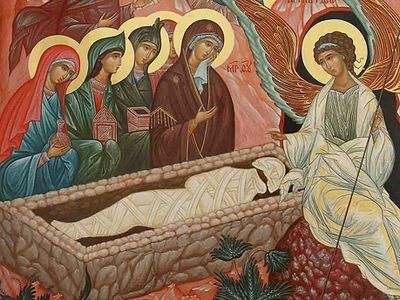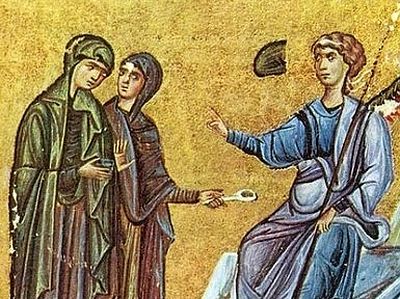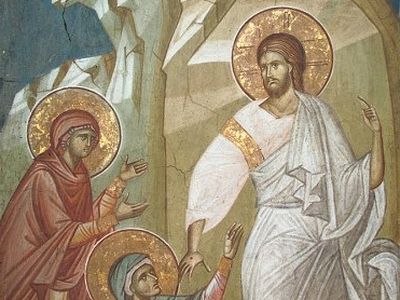Among the great virtues adorning the lives of the holy Myrrhbearing Women, the most striking were their holy zeal for Christ, their reverence, and their courage of soul. The Jews and Pilate placed a protection and fortification at the Tomb of Christ, our Savior, that His disciples could not come by night and steal Him! They rolled a huge stone up against the Lord’s Tomb, sealed it off, and placed strong and armed soldiers on watch. But all of this did not scare or frighten the holy Myrrhbearing Women. Their great zeal, sacred reverence, and courage of soul passed over all the Jews’ obstacles, and all the guards at the Tomb did not shake their resolve. But one thought, but one desire led their minds and hearts— to serve the funeral of their dear Savior with fullness of faith and with reverence.
Solomon once said, One man among a thousand have I found; but a woman among all those have I not found (Ecc. 7:28). And here are woman who are more brave than men. Men, the disciples of Christ, were hiding from fear of the Jews. Peter, fervent and firm in faith, thrice denied the Lord, of which he then repented and bitterly wept (cf. Lk. 22:62). But women, by nature timid and weak and often afraid even when there is no danger, here, at the service of the burial of our Most Holy Savior, turned out to be stronger and braver than men. They were not afraid of the Jews’ wrath or the brutality of the soldiers, and the guard at the Lord’s Tomb also did not agitate their hearts.
The disciples, men, affrighted and disbanded in all directions, as the Savior had predicted to them beforehand. But the holy women gathered themselves. The men were hiding, but the women went out in the light of day, heading to the market and buying myrrh and spices to anoint the Life-bearing Body of Christ. O, blessed women, how were you not afraid to go out alone at night, and how did you dare to approach that place guarded by royal soldiers, and how did you not fear, but strove to roll away the stone, break the seal, open the tomb and anoint the Body of the Lord with spices? These ascetic feats sprang from the zeal, reverence, and great bravery of your souls.
Feeble women by nature, but not in your minds and hearts; for womanly weakness did not appear in you in any way, but all your feats surpassed the bravery of men. Upon you were truly fulfilled the words of Scripture, which say, My strength is made perfect in weakness (2 Cor. 12:9), and again, God hath chosen the weak things of the world to confound the things which are mighty (1 Cor. 1:27; cf. Ps. 8:2, Mt. 21:16). The words of our Most Holy Savior were truly in your hearts, Who said, fear not them which kill the body, but are not able to kill the soul (Mt. 10:28). And again the Holy Spirit says, Be of good courage, and He shall strengthen your heart, all ye that hope in the Lord (Ps. 30:24). You completed the apostolic work before the apostles. You displayed the faith and courage of soul of the holy martyrs before them.
Elias the great prophet, ablaze with Divine zeal, rebuked Ahab, and you confounded the guards of the Lord’s Tomb. Gideon once crushed a multitude of Midianites with three hundred soldiers (cf. Jdg. 7:25). You, along with the righteous men Joseph and Nikodemos, stronger than all of the Jews’ and Pilate’s fortifications became fearless ministers, ready even unto death to serve Him Who came to serve and lay down His soul for the redemption of the whole of mankind. You, O holy women, together with the Most Pure Virgin Mary, the mother of our eternal Savior, with great zeal and bravery of soul gathered to celebrate the very first service to the Savior. Therefore, you were blessed even before the apostles to preach the Resurrection of the Lord.
Beloved faithful!
Who are these holy Myrrhbearing Women who followed Christ together with the apostles and were accounted worthy to be witnesses to the Lord’s sufferings, and to anoint His holy Body with spices as it lay in the Tomb? The holy Gospel briefly provides us their names and deeds.
The first and most full of spiritual zeal and courage is Mary Magdalene, from the city of Magdala in Galilee.
The other holy Myrrhbearers are Maria, the mother of James (Mk. 16:1) and of Joses (Mk. 15:47), who is the cousin of the Mother of God; Mary, the wife of Cleopas (Jn. 19:25), and Salome, the mother of the Sons of Thunder (Mt. 27:56; 28:1; Mk. 16:1; Lk. 24:10). Then there is Joanna, the wife of Chuza, Herod’s steward, Susanna, and many others serving Him out of their own means (Lk. 8:3). Among the Myrrhbearers were Martha and Mary, the two sisters of Lazarus from Bethany, where the Savior often stayed with the holy apostles on the way to Jerusalem or Galilee.
What were the main virtues of these holy Myrrhbearing Women? Above all, they firmly believed that Jesus Christ is the Son of God, the Messiah proclaimed by the prophets, Who came to earth to save mankind. Then, they led a life pure and holy, in prayer and fasting, abstinence, and almsgiving, abiding in sacred love for one another, and, as they were able, lovingly rendering hospitality to Jesus and His holy disciples.
However, the faith and zeal of the holy Myrrhbearing Women are not limited to this. They didn’t just receive the Lord into their homes, wash His feet, serve Him at the table, and provide Him the opportunity to rest, but more than that, they followed after Christ with zeal, and were witness to His miracles and boldly confessed that He is the Son of God, the Savior of the world.
But the Myrrhbearing Women’s greatest bravery was revealed during the Lord’s sufferings. After the disciples deserted Him in fear and Peter denied Christ, the only ones following Him from afar were the holy Myrrhbearing Women with the Mother of God at the head, Mary Magdalene, and the apostle of love, John, for it’s impossible to ever cast off Divine love.
The bravery and courage of the Myrrhbearing Women was seen on the path of the Cross to Golgotha. They alone, with St. John, accompanied the Lord to the crucifixion and were witnesses to His suffering. They alone prayed for Him with tears and deep sighs, such that the Savior, moved with compassion for them, said, Daughters of Jerusalem, weep not for me, but weep for yourselves, and for your children… For if they do these things in a green tree, what shall be done in the dry? (Lk. 23:28-31).
At Golgotha the holy Myrrhbearing Women, together with the apostle of immortal love, were also the sole witnesses to the crucifixion of our Lord Jesus Christ. They saw Him bleeding and falling beneath the weight of the Cross. They saw Him naked, without a robe, stretched out upon the Cross. They saw how His hands and feet were pierced with nails, and how He fainted under the Cross from pain. They heard the blasphemous words of the Jews, the repentant confession of the thief, and the heart-rending prayer of the Savior: Eli, Eli, lama sabachthani? that is to say, My God, my God, why hast thou forsaken me? (Mt. 27:46).
The Myrrhbearing Women saw how the sun was darkened, how the heavens groaned, how the dead arose from the graves, and they heard the prayer of the Son of God for the forgiveness of the Jews-murderers: Father, forgive them; for they know not what they do (Lk. 23:34). They, these women, braver than the apostles, more full of zeal than the disciples, saw how they cast lots for Christ’s tunic, sewn by the hands of the Mother of God, and heard His last word: Father, into thy hands I commend My spirit (Lk. 23:46).
How great was the zeal, the firmness of their faith, and the bravery of soul of the holy Myrrhbearing Women! They didn’t fear the Roman soldiers, so bloodthirsty. They didn’t fear the Jews’ fury, not fearing God, and were by no means afraid of the death of the Lord on the Cross, like those having no hope!
But the bravery of the holy Myrrhbearing Women was not limited to Golgotha. They were there on Friday evening when they removed the Lord from the Cross, and together with Joseph of Arimathea they bought a shroud and spices, anointed His Body with the spices, and wrapped Him in the linen, and laid Him in a sepulchre which was hewn out of a rock, and rolled a stone unto the door of the sepulchre. And Mary Magdalene and Mary the mother of Joses beheld where He was laid.
And when the sabbath was past, Mary Magdalene, and Mary the mother of James, and Salome, had bought sweet spices, that they might come and anoint Him. And very early in the morning the first day of the week, that is, Sunday, they came unto the sepulchre at the rising of the sun. And they said among themselves, Who shall roll us away the stone from the door of the sepulchre? And when they looked, they saw that the stone was rolled away: for it was very great. And entering into the sepulchre, they saw a young man sitting on the right side, clothed in a long white garment; and they were affrighted. And he saith unto them, Be not affrighted: Ye seek Jesus of Nazareth, which was crucified: He is risen; He is not here: behold the place where they laid Him. But go your way, tell His disciples and Peter that he goeth before you into Galilee: there shall ye see Him, as He said unto you. And they went out quickly, and fled from the sepulchre; for they trembled and were amazed: neither said they any thing to any man; for they were afraid. Now when Jesus was risen early the first day of the week, He appeared first to Mary Magdalene, out of whom He had cast seven devils. And she went and told them that had been with Him, as they mourned and wept (Mk. 15:46-16:10).
Do you see the zeal of the Myrrhbearers, and their bravery and firmness of faith in the Son of God? Do you see the courage of these holy women? The disciples sat, hiding and locked away in a room from fear of the Jews, but they bought a shroud and spices to anoint the Body of Jesus. The disciples wept and lamented the death of the Lord, but they ran to Golgotha at sunrise to see His Tomb. In fear, those waited for news from Golgotha, but these, entering into the Tomb, received from the Archangel Gabriel the news that the Lord is risen, with the words, “Weep no more!” Then, by his command, they ran back and told the apostles that Christ is risen—He is no more in the grave!
So much courage and faith, so much steadfastness and boldness these women had. The men sat, hiding, but the women ran to the Tomb, entered within, bearing spices, encouraging one another, spoke with the angels, and were the first to see the Life-bearing Tomb and the shroud folded nearby. They feared neither darkness of night, nor the soldiers guarding the Tomb, nor death, nor angels—nothing. They had but one desire—to see Jesus, and anoint and kiss His holy Body. The Myrrhbearing Women were the first and most worthy witnesses of the crucifixion, death, burial, and Resurrection of the Lord. They were the first to proclaim to the apostles and the whole world that Christ is risen, and that death, the devil, and hell are vanquished and Paradise is open wide.
Where now are such women, loving Christ with such firmness of faith and good deeds as the Myrrhbearing Women from the Holy Gospel?
Still, the number of holy women in the Christian Church increased and sometimes even exceeded the number of men. Recall the great host of the holy martyrs, such as Thekla the Equal-to-the-Apostles; Barbara, killed for Christ by her own father; Ekaterina; Irina; Mary; Sophia with her three daughters; Fevronia; Tatiana and Philothea of Argesh,1 and the great number of venerable women who labored in monasteries and deserts, becoming vessels of the Holy Spirit and working wonders. Let us mention but a few of these: Mary of Egypt, Euphrosynia, Ksenia, Pelagia, Melania, and also the venerable Parasceva of Iasi, Theodora of Sihla, and many others.
All of these holy brides of Christ, disciples of the holy Myrrhbearers and ascetics of prayer of the Church, pray for us all.
Beloved faithful!
Today is the day of Christian women. They are the successors of the Myrrhbearing Women, the daughters of the Resurrection, the handmaidens of the Lord, lanterns of faith, the soul of the family. Christian women, believers of the Orthodox Church, preserve the flame of faith and ancient traditions and the holy flame of prayer and piety in our homes more than men. Believing women are at the same time good mothers, dedicated Christians, honest and hardworking wives, and models for society. Faithful women are the first to church, the first in prayer, in fasting, labors, alms, reading good books, in care for the sick and for all. They preserve the spiritual warmth of faith, love, patience, and peace in church, family, and society.
Our families are in need of such wonderful mothers today. The Church of Christ is in need of such pious daughters. The society today in which we live is in need of such honest and model women for all. For so many mothers do not want to bear children, or to give them a good Christian upbringing. How many women kill most of their children, and those few that they bear are not raised in the fear of God, and they don’t care for them, so they become burdens to their families and a disgrace for society.
Mothers, you are today’s myrrhbearers of the Church of Christ, bringing the Lord not precious spices, but your purity of faith and good children, well raised and faithful. Speak to them most of all about God, the saints, the Church and our ancestors. Tempt them in nothing, and give them as many good books as possible to read. You can make a huge contribution to the spiritual renewal of the world, the Church, and society. Add holy oil to the souls of your children. Tomorrow great souls will come from them, good people, devout priests, enlightened teachers, and exemplary Christians. The future of families, children, and the Church depend on you most of all. Always be about the fulfilling of your duties, as were your own mothers. Remember what holy mothers you had!
Young girls, for the sake of the Lord preserve your honor and good faith unblemished, while you have not yet received the status of mothers in the Church and society. And you also, widows and older mothers, keep an eye on the young, on your children, on all those around you. Do not be silent! Young mothers are in need of your example and sacrifice, young virgins are in need of your advice, and children and grandchildren of your prayer, tears, and reproofs.
Begin everything with the Lord, with prayer, with regular confession, and greater humility and patience. More good mothers, and more honest and faithful widows and virgins today will mean more children in homes, more believers in church, more peace in families, less drunkenness, divorce, and abortions in the world, less disease and tears in the world and more souls in Paradise tomorrow! Amen.
Christ is Risen!








